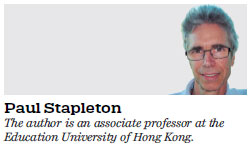Stop this absurdity of forcing people to retire in their prime
Updated: 2018-11-05 06:02
(HK Edition)
|
|||||||
Paul Stapleton says it is wrong to force our best and brightest to retire too early
Once again this year, Hong Kong's universities are shining in the spotlight. In the recently released Times Higher Education World University Rankings for 2019, five local universities were included in the top 200. In a world of competitions where fourth place doesn't even merit a medal, this accomplishment in the Times list may seem modest at best. However, those familiar with the world of scholarly rankings know this is nothing to sneeze at.
Comparing Hong Kong's population of 7 million with heavyweight countries in the rankings, such as the United States and the United Kingdom, an argument can be made that Hong Kong comes out on top on a per capita basis. Just for example, Japan, with 126 million people, has only two universities in the top 200. Even when it comes to sibling rivalry, Hong Kong fares well: Singapore, our feisty twin sister, could only manage two universities in the top 200.

Against this backdrop, although Hong Kong can presently bask in the glow of international acclaim, as with all competitions, we cannot rest on our laurels. For example, mainland universities are rising quickly in the rankings. Tsinghua University in Beijing has come from nowhere in recent years and now stands at 22nd place, far higher than any university in Hong Kong.
By coincidence, a recent discussion in the media has highlighted an area of concern that could have a negative impact on our high rankings in the not-so-distant future. I speak of the archaic policy held by several universities in town that forces academic staff to retire at 60 years of age. Presently, among the eight local, publicly funded universities, four of them - University of Hong Kong, the Education University of Hong Kong, Polytechnic University and Baptist University - set their retirement age at 60 despite the government's decision in 2015 to raise the retirement age to 65 in alignment with international standards for civil servants. Notably, a more enlightened retirement age of 65 is set at Hong Kong's four other publicly funded universities. There is a good rationale for this.
In many senses, academia can be considered different from other professions. Paid posts tend to begin later in life than in most occupations. Academic staff at universities generally land their first job after their 30th birthday. This is because it takes several years of doctoral studies, and often post-doctoral posts, during which time a scholar builds up her publication record before she lands a tenure-track job. Because the standard length of time it takes to succeed in being granted tenure is six years, typically, a newly promoted tenured professor is already over 40 years old before she has finally started to feel secure. In my own case, I was 47 years old when I received my doctoral degree, which gave me just over a decade before facing the retirement age. Granted, I was a late starter, but there are plenty more with stories like mine.
Presumably, the main reason for retaining the relatively young retirement age of 60 at the four universities named above is to get rid of non-performing staff. But this is a specious argument. As anyone who works in a large organization knows, there are always deadbeats. It's the nature of large numbers: Any time there are a large number of staff, there will always be a few outliers who fall far below the norm in terms of their performance. As you read this, a certain individual in your own organization probably comes to mind. Thus, if the reason for having 60 as the retirement age is to remove deadbeats, then why not make the cut-off age much earlier, or make contract renewal, or continued tenure, completely dependent on performance as it is in the private sector?
Even if the reason for such an early retirement age is to save money, again the argument fails. Presently, head hunters are offering attractive packages at overseas universities - Australia is especially active in poaching Hong Kong's senior academic staff - where professors can work well beyond the age of 65 while boosting their new employers' reputation. The simple fact is that many professors are just hitting their stride in their late 50s and early 60s producing their best work, often with international collaborations built up over the years. More than ever, we live in an international marketplace and if some Hong Kong universities continue to throw senior staff out to pasture at their peak, other universities will happily be the beneficiaries of our largesse.
Returning to the Times rankings, which is generally recognized as the gold standard, Hong Kong can ill afford to be complacent. Such lists are closely watched by young scholars hoping to study or land a job at a high ranking institution. By retaining the outdated retirement age of 60, some of our universities risk losing high-quality academics in their prime and suffering a subsequent decline in the rankings. It is also worth noting that the current mandatory retirement age was set in the Industrial Age and that in the cases of some countries, a decade or two in average life span and productive years has been gained. Forcing our best and brightest out to pasture when they are at their most productive and creative seems absurd. As an alternative, our universities could remove mandatory retirement age altogether, but subject academic staff to medical assessment and external review before allowing for continued service beyond 65.
In an era where we often hear that 60 is the new 50 (or even 40), 65 years of age should be considered the very youngest age at which academics are forced to retire.
(HK Edition 11/05/2018 page17)